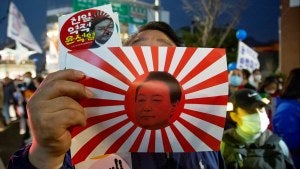Can a State Dinner End South Korea and Japan's Fight Over History?
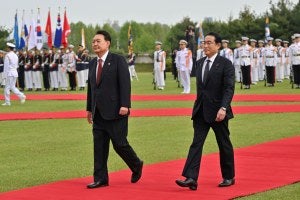 Play Podcast
Play Podcast
About the Episode
President Biden hosted South Korean President Yoon Suk-yeol at his second-ever state dinner as part of the US strategy to get the strained South Korea-Japan relationship back on track. On Deep Dish, US Institute of Peace’s Frank Aum and the Wilson Center’s Shihoko Goto explore the reasons for the recurring ruptures over history, why the United States cares, and the implications for geopolitics in Asia.
[Brian Hanson: Intro: This is Deep Dish on Global Affairs— going beyond the headlines on critical global issues. I’m your host, Brian Hanson, with the Chicago Council on Global Affairs.
Yesterday, President Biden hosted only the second state dinner of his presidency, this one with South Korean President Yoon Seok-Youl. During the press conference, Biden tried to reassure allies that they have the US' support and its military backing.
(AUDIO CLIP) Biden: Look. Nuclear attack by North Korea against the United States or its allies or partisans - or partners is unacceptable and will result in the end of whatever regime were to take such an action.
And Biden even surprised guests by inviting Yoon to sing one of his favorite songs...
(AUDIO CLIP) Yoon: Sings American Pie
Throughout the evening, there was lots and pomp and circumstance and lofty rhetoric about the US - South Korean relationship which is indeed important. But underneath the pageantry is a deeper, ongoing tension within another political relationship key to security, economic, and diplomatic cooperation in Asia – namely, the relationship between South Korea and Japan. In the last 6 years, relations between South Korea and Japan have reached new lows, significantly hampering US and regional efforts to counter security concerns about North Korea and China, as well as blocking cooperation on a host of important economic and diplomatic issues. Holding this state dinner with South Korea is all part of a US strategy to get the relationship between those two countries back on track. So why has the South Korea – Japan relationship been in such bad shape? Why is it so important for the US to facilitate rapprochement between the countries? And what is at stake for geopolitics in Asia?
To explore I am joined to today by Shihoko Goto is the director for Geoeconomics and Indo-Pacific Enterprise and the deputy director for the Asia Program at the Wilson Center. Her research focuses on the economics and politics of Japan, Taiwan, and South Korea, as well as US policy in Northeast Asia. And I am also joined by Frank Aum the senior expert on Northeast Asia at the US Institute of Peace. He focuses on ways to reduce tensions in the Korean Peninsula and strengthen diplomacy, peace and stability in the region.
Welcome to Deep Dish, Shihoko and Frank! It’s so good to have you both here.]
Brian Hanson: So before we jump into the challenges that have been so important in this relationship between Japan and South Korea, I wanna start by just laying out some of the common security, economic and diplomatic, concerns that the countries actually have in common, and also many with the us. And Frank, if I could start out with you where are their overlap interests in those area?
Frank Aum: Sure. So, since the end of World War ii, both countries south Korean and Japan have recognized the need to settle, you know, past issues from the period when Japan had colonized, Korean improved their diplomatic ties in order to address many common challenges, right? Things like achieving economic prosperity, strengthening national security, and of course there are a lot of new challenges that the two countries face today like climate change and global pandemics. And this is in addition to the constant threats from countries like China, Russia, and North Korea, and you know, resolve their differences. South Korea and Japan have negotiated various agreements over the years, such as the 1965 normalization Treaty and claims agreement, and the 2015 Comfort Woman Agreement and these agreements allow the two countries to improve relations sufficiently enough to achieve the gains that they were looking for and things like security and prosperity, right? And the problem was that these agreements for the sake of political expediency were often vague and paid insufficient attention to the concerns of colonial era victims, such as victims of forced labor and, comfort women, for the Japanese Imperial Army. And because these agreements were vague and didn't resolve these fundamental questions about the colonial period, they remain controversial, and subject to different interpretations and even the recurring risk of collapse. Right? So I think that's generally where we were.
Brian Hanson: That's, that's really helpful. Just for listeners who may not understand the period, it's really from about 1910 to the end of World War II where the period of the concern about Japanese actions of forced labor, sexual servitude of Koreans really comes into play and drives this dynamic. Shihoko, what would you add to that security, economic and diplomatic picture of where there are actual commonalities between what, South Korea hopes to achieve and what Japan would like to achieve.
Shihiko Goto: So both countries are advanced economies in a region that is facing a lot of risks, politically, economically, militarily, and there is a interest on the part of the United States to make sure that these two countries work together. So that there is closer coordination, information sharing, and quite frankly, trust amongst, the countries to work together. So what are some of the challenges that go beyond the obvious such as the rise of China, the North Korea threat, China potentially invading Taiwan and the like, and I would say domestically too. These two countries share a lot of challenges. So both Japan and Korea, again, have done really well economically, but they're both facing shrinking demographics. People just aren't having enough babies. And it's a very rapidly, aging society as well. women in both Japan and Korea are finding it difficult to really be able to take on leadership roles. and that's a tremendous challenge, especially at a time when we're talking about a depopulation in both countries. Both countries have incredibly. well-educated populations, but it also stifles creativity. The competitiveness to get into the top universities in Korea are grueling. But at a time when we are trying to move forward in a service, economy, it's really about ideas and innovation that will jumpstart growth, and both countries are finding it difficult to meet that kind of challenge. And then more broadly, both countries, they're doing well economically now, but when we see, the continued growth of China, the rise of India, the dynamism of Southeast Asia and the like, both countries want to remain relevant. Right? So they want to actually be competitive. And so these two countries have a lot to learn from each other, to share information. And I would argue that they have a lot to benefit from in working together to find, solutions, to these big issues that are hampering their future potential.
Brian Hanson: And as I listen to both of you, I'm just thinking of my good realist friends, you know, the IR school that says basically foreign policies are gonna Determined by structures in the system. And I'm hearing a whole lot that should drive both countries in a common direction. And as we've already started to touch on there has been this big set of historical issues about forced labor, about, sexual servitude, that is deeply unresolved and flares up and gets in the way of, cooperation. Frank talked a little bit about, some of the ways this looks inside of South Korea and some of the deep concerns and, not feeling that those concerns have been appropriately addressed. Shihoko, could you talk a little bit about how these issues look inside of Japan and where the tension from that side comes from as well?
Shihiko Goto: Right. So there is this, challenge of, historical memory that continues to plague Japan, not only in its relations with South Korea, but also with North Korea, with China, with a lot of Asian countries as well, where Imperial Japan was an occupying force and, committed war crimes including sexual slavery across the continent. Now, Japan also was defeated in World War II. And so the narrative in Japan when it comes to learning the lessons of history are a bit mixed. on the one hand, there is this recognition of the atrocities committed by the imperial, Japanese army, but the bigger issue that is really taught in Japanese schools is about Japan as victim. Uh, Japan was, occupied after World War II by the United States. it is the only country to date that has had not one, but two atomic bombs dropped on by the United States. And Japan would argue that even though it has suffered, it actually has really strong ties incredibly good relations with the United States it's been able to have normalized relations with Korea in 1965 and it has paid reparations for it. it's concluded. and that should have been the end of, the story of, normalizing relations between the two countries. And so the four momentum should be for the two countries to look forward and to address the issues that they share, in the future rather than simply looking into the past. The biggest challenge that Japan has regarding Korea and historical memory, is that, agreements that have been signed, including compensating these sexual slavery, so-called comfort women, is, that it was agreed upon by the Korean government, but with an advent of a new administration. That was actually ripped apart, by Korea.
Brian Hanson: So this was in like 2018 a new administration came in
Shihiko Goto: Yes. So, that becomes the problem. And so I think what is happening is there's a lot of fatigue on the part of Japan they believe that they have apologized, that they have taken steps to address the historical issue, but with the advent of new administrations, it's always back to square one, and so we have a momentum now where President Yoon is really pushing hard to improve, relations with Japan, and that is very welcome in Tokyo as well. But at the same time, there is some concern about how much leg this actually has and whether a new administration would once again, tear that and we would be back to square one again.
Brian Hanson: Yeah, and I guess as an American, I mean, we certainly understand the change of administration. Directional change is possible in policies and things that we're agreed to are no longer agreed to. Frank can you help us understand kind of what's happened on the South Korean side when there was an agreement for one president, president park, and then a, new president comes in, and moves in a very different direction. what are the politics that drive that? And can you talk a little bit about how severe the reaction was?
Frank Aum: Well, I think you actually have to go back even further to a lot of the other past agreements between the two countries. and Shihoko, outlined the differing, memories of history and war, and I think that's absolutely correct. So from the South Korean perspective, one, they feel that the Japanese colonization over South Korea between 1910 and 1945 was illegal. Whereas I think the Japanese view is that, well, yeah, other countries were doing it and, you know, we were fighting against Western imperialism, so we were actually trying to liberate Asia so it's not illegal. It's something that, was regrettable, but, Korea's view is very different that it was illegal, right? So, that was, one of the main issues that the two countries were looking at when they were trying to normalize relations in 1965. And of course, they were trying to do this for many years, basically, since the end of World War II. and the US was putting a lot of pressure on both sides to reconcile, right? Because this is a period during the Cold War when the US trying to rehabilitate Japan, but also strengthen, both South Korea and Japan. And so they were putting a lot of pressure on both countries to ties, and normalize relations. And for a variety of these historical issues, these countries could not. So when you get to the discussions that led to the 1965 normalization treaty, there were these issues that the two sides couldn't reconcile. one was the legality of colonization, but when you even look at the language of the normalization treaty and the claims agreement, it's very vague, right? It doesn't say what specific claims are being settled. It just says that all claims were settled. There's different views about what the money that Japan provided to Korea was for. So, Japan provided 500 million dollars to, South Korea in, grants and loans, South Korea told their public that it was reparations. But Japan characterizes as basically congratulatory, like, we're providing this money, but it's not for reparations, so why do we need to provide reparations? Right. And that's a big issue too, because in the 1951, Peace treaty in San Francisco, Japan was required to provide reparations to a lot of these countries. But South Korea was not a party to that Peace treaty because they were excluded for a variety of reasons. So, I wanna fast forward to the 2015 Comfort Woman Agreement. again, this is, an agreement that. the two countries reached, with a bit of controversy because, there are many people in South Korea who believe that, this agreement was reached without taking into consideration the voices of the actual comfort woman. Right? They wanted many, things, but it was an agreement that was reached verbally between the two governments. and didn't address a lot of things that these victims were asking. and there are also side deals that were done covertly. for example, there were all these, uh, comfort woman statues and memorials that were put up, and Japan wanted those removed, but that wasn't made public until later. So there's a lot of feeling in South Korea that it was deals between the two countries were reached, But also didn't take, into account the voices of the victims.
Brian Hanson: Shihoko, if I could bring you into this narrative, because things got quite contentious then in 2018 There is a dispute among causality, about who did what for what reason, but it escalated very quickly and Japan ends up, imposing, Pretty severe sanctions on exports of key chemicals for, the electronics industry in South Korea, can you talk a little bit about why that escalated at this time so significantly, to involve some of these issues?
Shihiko Goto: Yeah, so there are two parts to this. on the political sphere, there is the retraction of the comfort woman agreement, but also the steps by the Korean Legislature to, take punitive action against Japanese wartime, slavery more broadly. So Koreans, who were forced to work for Japanese, big conglomerates during World War II for the Japan's war efforts were essentially indentured and they were not, obviously compensated because they were forced laborers. the courts of Korea decided that the assets of these Japanese companies in Korea would actually be seized to compensate for the wartime laborers and so the Japanese would argue that no Korea was not taken off the white list and The three chemicals that are needed for semiconductors were put on export restriction, not export ban, because they were concerned about Korea leaking information to North Korea, that was their official argument, but it became pretty clear that it was a response to these political actions, by Korean government. Now, I would argue that, from a foreign ministry perspective, From both Korea and from Japan. They want a solution. They want to see the two countries work closely together. But as Frank pointed out, some of the efforts that have gone in have not been seen as inclusionary that the actual stakeholders the public voice was not really reflected in this. Some would argue that the latest move by President Yon too falls into this trap that it hasn't taken into consideration fully the political voice of Korea. If we were to look forward on this, I would say the end goal. Of policy makers in both countries is to be able to move forward. This the region is on fire.
Brian Hanson: So Frank, one of the things that is a common narrative is that the United States used the state dinner, and like I said, it's only the second one in Biden's whole administration. So it's a pretty big goody high recognition, of the relationship with Korea in order to create a, sweetener for President Yoon. To make this new agreement. Could you talk a little bit about the dynamics of this new agreement and why now are we moving forward in this way?
Frank Aum: You know, we talked about the comfort woman situation a little bit, but there's also the forced labor situation that Shihoko mentioned. And so in 2018, there were two South Korean Supreme Court decisions that held that Japanese companies had to compensate Korean victims of forced labor. Right. But this ruling went against. Japan's position that all of the victims claims were settled by the 1965 claims agreement. So this court decision basically angered Japan, right? And it led to the strain, bilateral relations and economic ties and reduced security cooperation between the two countries. So, you know, you fast forward to today, right? President Yoon, decide to resolve the victim's claims by creating a foundation that would compensate the victims. But by using donations from South Korean companies that benefited from the money that Japan gave back in 1965, and then, this deal didn't use, voluntary contributions from Japanese companies. So naturally Japan was very happy with this decision because it allowed them to maintain their interpretation of the colonial period and the 1965 agreement. So we're seeing relations get back on track, based on these recent moves. As a direct result of South Korea's decision, Japan agreed to a visit by President Yoon, which was the first bilateral summit, between the two countries in 12 years and at the summit, the two countries agreed to things. Like resuming diplomatic ties and security dialogues, normalizing an intelligence sharing agreement and taking steps towards resolving some of the ongoing trade disputes that we've mentioned earlier. Japan also lifted, export controls on South Korea that we talked about related to the high tech industries and business iterations in both countries announced that they'd be contributing funds to support youth scholarships and exchanges. So I think this all sounds great from a diplomatic and security perspective. The problem is that, and again, Shihoko referred to this, the current arrangement seems to be following the same unfortunate pattern of the past law deals, which is ignoring the voices of the victims of the court cases I mentioned, there's 15 sets of victims. Three of the forced labor victims have refused to accept the compensation money because it's not coming directly from the relevant Japanese companies and because it's not accompanied by what they feel would be an appropriate Japanese apology. And if these claimants don't accept the money, Then is unclear how some of these South Korean court cases will be resolved, which puts the entire arrangement between South Korea and Japan at risk.
Brian Hanson: So Shihoko, this seems like a very fragile situation. moving forward, how do you see it and what are some of the dynamics inside of Japan about the agreement as well?
Shihiko Goto: So one of the concerns that Japan has is whether history is going to repeat itself in terms of, even if things were to go well under the current unit administration, what happens when there is a election? And again, Korean presidency is only for one, term limit of five years. So there is going to be a new president is this going to stick or not? and that is really where the Japanese are less willing to commit, full on to an agreement unless they can see that there is considerable domestic support within Korea, the agreement. And right now it seems to be. Somewhat on shaky ground because as Frank said, the victims themselves, have a very mixed response to it. So the, anger and the frustration, continue. it's gonna be a long time before we see Japan and Korea hosting the World Cup again or having some kind of, big momentum. But I actually, am hopeful about this because we are, focused on the response of the victims and the, response by governments but the cultural exchange between the two countries is tremendous. And the k-pop, K beauty, k drama.
Brian Hanson: Which is Korean's pop culture, which has taken over the world!
Shihiko Goto: It's, it's taken over the world and Japan is definitely totally, under its tsunami of Korean culture. And the Japanese youth love it. Korea has become very aspirational for a lot of people and so my hope is that. culture can prevail and the political discourse can actually take some cues from that kind of positive cultural momentum.
Brian Hanson: So Frank, let me ask you about the South Korean side and, we've got a political leader who has, taken a very forward-leaning position, in this case. what are some of the most important things that can happen during this moment of. Better relationships that are genuinely important for security, economic and diplomatic issues in the region, are there concrete things that can happen that will improve the situation for South Korea? As you know, Shihoko said so well, I mean, the regions on fire.
Frank Aum: I do wanna start with a different point first because, it is probably a, predominantly US audience, so they're Probably thinking, okay. There's obviously a lot of things at stake for the two countries, but what about the us? What's at stake, for us? so I wanna emphasize first that, over 70 years, the US approach to the Asia-Pacific region has been centered. Creating a network of alliances to advance our national interests, including military security, economic prosperity, and democratic ideals. And for a variety of reasons, we've done this by creating, what's known as a hub and spokes model, right? Where we, the United States are the center hub. And we operate through separate bilateral alliances as the spokes. And even today, the Biden administration is focused on building a free and open Indo-Pacific region in collaboration with our allies and partners. And this means that we need robust cooperation from our friends in order to achieve things like a rules-based international order and freedom of navigation in the seas. Right. But when our two greatest allies in the region, South Korea and Japan aren't getting along, then this is a really huge problem for the entire endeavor. These two countries, like Shihoko mentioned, are flourishing democracies. They have some of the strongest economies and militaries in the world. They share democratic ideals and norms. So it's really unfortunate, both strategically, but also from a human perspective that they haven't fully resolved their historical. and so getting back to what South Korea is looking for, we're starting to see some of these things, even starting last year, before this, South Korean decision slash agreement was announced that the two sides were already working better together bilaterally, but also in the trilateral context they've increased a lot of, high level meetings. We've seen multiple trilateral meetings among the three leaders, Biden, TDA, and noon, as well as among the foreign ministers, defense ministers, and military. Last November at the East Asia Summit, the three leaders declared a trilateral statement on a partnership for the Indo-Pacific, which outlined, know, a multitude of ways that countries will cooperate on regional security and economic issues. And it's also expected that Japan will invite President Yoon to the G7 meeting, which is gonna be held in Hiroshima. and then even on the military side, starting last year and continuing in this year, we've seen a return to the trilateral military exercises that had gone on pause during the previous South Korean administration exercises related to ballistic missile defense, missile tracking, anti-submarine warfare and air maneuvers. All these things that are very important when we think. the threat from North Korea, right? And then two months ago, the US South Korea and Japan announced the launch of the Economic Security Dialogue, which is a forum for addressing critical and emerging technologies and supply chain resilience that, we're thinking about as we, consider the, strategic competition with China and South Korea, Japan are also engaging again on the multilateral level, right? Including the Asia-Pacific four partnership with NATO and the quote unquote CHIP four grouping related to major semiconductor producing industries. So this is a lot of stuff, great stuff happening right now between the two countries, and tri laterally with the us.
Brian Hanson: So Shihoko, what would you add to that list of accomplishments and can these help with the domestic political concerns about whether or not there can be support for this, agreement in the long run.
Shihiko Goto: Well, let me start with the good news. The good news is that. Matter how bad relations between tokens, soul get, they're not gonna go to war with each other. So in a region that is incredibly fragile and incredibly tense, that is really something that I cannot emphasize enough. So the immediate urgency is not as much as it is for Taiwan. However, given the, concerns, about Taiwan and for China Yes. Russia and the like the need for the two countries to work closely together to enhance efficiencies, to make sure that, there is, critical information shared in a timely manner and there is coordination on the military front as well as on energy security if there are opportunities for the three sides to work together, then the United States would certainly be committed, to tapping into those. But right now, Washington has taken more of a backseat that it will intervene as needed, but it is trying to allow the two sides to work together and I think the, flurry of meetings, the opportunities, for the two leaders to meet and for the various ministries to actually work together and for those opportunities to actually be, taken. Full advantage of is very heartening. So will this lead to a improvement in public sentiment? In Korea, I don't know, but in Japan, just the, Yoon visit itself, really humanizing President Yoon and his. Having, not one, but like two rounds of beers, like in two different places, like one with the wives, one without the wives. That has really helped in improving Japan's public image and Japanese expectations for what a future roadmap with, Korea can be. So I remain hopeful.
Brian Hanson: And Frank, let me close with you and just ask you, what would you encourage our listeners to pay attention to as this situation continues to play out?
Frank Aum: Yeah, I guess the way I would frame it is that it is never good to be in a situation, like I said earlier, when our two of our strongest allies are not cooperating. And I would say prior to this year, basically from 2018 to 2022 was one of the worst periods of, South Korea, Japan relations. And I'm would characterize relations then with a grade of c. And today with the recent South Korean decision and the deal, it's, more like a b plus, right? So there's a lot of great things happening, but then I guess one would ask, you know, what would made for an, a relationship So at a basic level, I think the two sides should have military liaison officers embedded in each other's military commands. Right now they don't. there is a presence of various military officers from a lot of different foreign countries at the US South Korea Combined Forces Command, but there's no Japanese liaison officer. And then likewise. Despite how important the United Nations command rear bases in Japan would be in a Korea, contingency scenario, there's no South Korean liaison officers at important Japanese defense institutions and I think this leads to, poor bilateral coordination on real contingency scenarios like the Chinese and Russian Air. In the body of water between South Korean and Japan that the two countries didn't coordinate well on another example is the informal Quad Network. it's a framework of four countries, Japan, United States, India and Australia, that work together to advance a free and open Indo-Pacific. Five years ago, there was a different South Korean president who wasn't as accommodating toward Japan and more concerned about how South, Korea's alignment with the quad might be perceived by China's antagonistic. So it was easier to explain away South Korea's relative lack of integration into the quad framer. But today with, President Yoon wanting stronger ties with Japan, he wants South Korea be perceived as a global pivotal state and a champion of this liberal international. So South Korean's participation in the quad, towards like, working level groups, and then on the very aspirational or optimal end of what South Korea Japan could be doing are things like an integrated missile defense system or even a trilateral US South Korea, Japan Alliance. Right. That seems very pie in the sky, but. it might be a useful exercise to think about what could the two countries achieve if there was a fundamental enduring reconciliation. for example, you know, what could happen if Japan and South Korea resolved their territorial disagreements about the sovereignty of the Dokdo/ Takeshima islands. what could happen if the two countries could develop a more common understanding of historical issues, including the legality of Japanese colonization? what could happen if Japan pursued the same type of reconciliation that occurred between Germany and or that Germany pursued with the Jewish community in Israel. I don't think we'll see Willy Brandt this moment, where he's kneeling in the Polish, the Warsaw ghetto. but if we have this type of more, fundamental enduring reconciliation, I wonder how much stronger Japan South Korea ties could be. Is this a part of the reason Why we don't have a NATO like mechanism in Northeast Asia? I don't know the answers, but you know, it seems clear at the moment that the leaders of the three countries are happy with this B plus relationship For now at least. And then they hope that habits of cooperation today can allow an, a relationship to develop incrementally over time. But it's hard to say, in South Korea 60% of the public disapproves of how President Yoon resolved the forced labor issue. and in Japan, there's lingering pockets of anti-car racism the ongoing efforts to downplay some of the ways that historians address what happened, during the Japanese colonial period, particularly in textbooks. So, it's gonna be a long-term process, I think these issues aren't going away soon.
Brian Hanson: Frank Aum of the US Institute of Peace and Shihoko Goto of the Wilson Center, I wanna thank you both for being on Deep Dish and helping us unpack the really complex set of relationships where these historical legacies between South Korea and Japan are having a really large role in shaping our world today.
[Brian Hanson: OUTRO: And thank you for tuning into this episode of Deep Dish.
As a reminder, we want to hear more from you, our listeners, so send us an email or better yet, a voice memo to deepdish@globalaffairs.org. You can suggest issues you'd like us to cover, guests you'd love to hear from, or you can just let us know how you think we're doing.
And if you're looking for more deep dish in your podcast diet, tap the follow button on your podcast app so you get each and every new episode as soon as it's released.
If you think you know somebody who would like today's episode, please tap, share and send it to them. As a reminder, the opinions you heard belong to the people who expressed them and not the Chicago Council on Global Affairs. This episode is produced and edited by Kyra Dahring and mixed by Frank McKearn at Aphorism Productions.
Thank you for listening. I'm Brian Hanson, and we'll be back next week with another slice of Deep Dish!]






Related Content
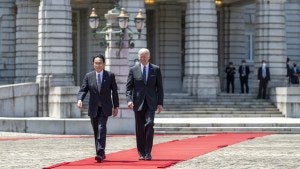 Public Opinion
Public Opinion
Survey results reveal how Japanese perceptions of security in East Asia have changed following Russia's invasion of Ukraine.
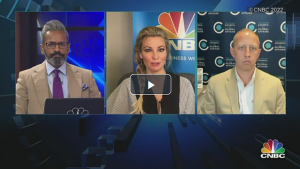 Global Politics
Global Politics
Karl Friedhoff joins CNBC Asia to discuss South Korean President Yoon's low approval ratings.
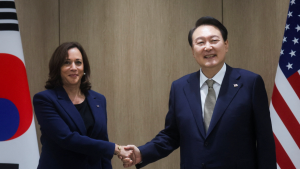 Public Opinion
Public Opinion
A majority support using US troops to defend Seoul should North Korea invade, Council polling shows.
